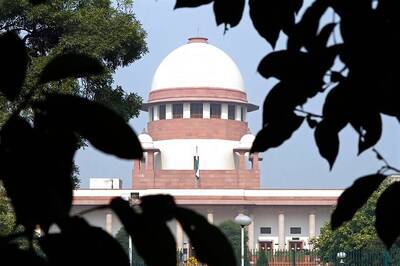
views
Mumbai: The Bombay Stock Exchange (BSE) Sensex fell 1.7 per cent on Tuesday to its lowest close since August, extending January's worst monthly slide in more than two years, as inflation worries and hardening interest rates continued to spook investors.
Traders said rising world oil prices, triggered by concerns the political turmoil in Egypt could spill over to the Middle East, could accelerate price pressures in India which imports about 80 per cent of its oil requirement.
Energy major Reliance Industries and frontline software and financial stocks were among the losers, as risk appetite among foreign investors took a hit.
"People are reviewing their position. The major monetary indicators which foreign investors look at are all negative. So, money with a shorter term perspective is fleeing," said Sanjeev Patkar, research director at Almondz Global Securities in Mumbai.
Input prices jumped in Chinese and Indian factories in January, adding to pressure from food inflation that the fast-growing economies are already struggling to contain, business surveys showed on Tuesday.
Inflation has been a concern for policymakers in most developing economies, including India, where rising food prices have driven up broader inflation and put more pressure on central banks to tighten policy.
The 30-share BSE index dropped 305.54 points to 18,022.22, its lowest close since August. 31. At one stage, the benchmark dipped below 18,000 for the first time in five months after the market had opened higher.
Only three of its components ended higher.
The index is down about 12 per cent this year, after having risen 17 per cent in 2010, as worries about surging inflation in Asia's third-largest economy lead to withdrawals by overseas portfolio investors.
Foreign funds were net sellers of $1.2 billion worth of shares last month until Jan. 28. Last year, inflows had hit a record $29.3 billion.
Reliance Industries dropped 2.6 per cent to Rs 895.65, its lowest close since July 2009, mainly due to a selloff by foreign funds.
The Economic Times reported on Tuesday a state auditor could question the government approving the company's high capital expenditure to develop gasfields off the east coast of India.
State-run oil refiners that sell most fuel at government-set low prices fell as oil stayed firmly above $100 a barrel. Indian Oil Corp shed 3.5 per cent, Bharat Petroleum fell 5.8 per cent and Hindustan Petroleum slipped 4.1 per cent.
Software exporters Infosys fell 1 per cent to Rs 3,086.20 and Tata Consultancy Services lost 0.6 per cent to Rs 1,150.35, as worries about outsourcing business momentum kept investors on the sidelines.
Smaller rival Wipro fell 2.2 per cent to Rs 428.95.
Largest-listed developer DLF fell 1.4 per cent to Rs 220.80 after it painted a cautious near-term outlook on rising borrowing costs and reported a drop in quarterly earnings.
The Reserve Bank of India last month raised interest rates for the seventh time since March to curb stubbornly high inflation.
Rising borrowing costs are also expected to crimp demand for automobiles and leading car maker Maruti Suzuki fell 1 per cent after reporting January sales grew 14.7 per cent -- its slowest monthly rise since last March.
Tata Motors, which makes commercial vehicles and cars, shed 6.9 per cent. Its January sales rose 15 per cent.
Auto sales in India grew a record 31 per cent in 2010, driven by a burgeoning middle class, but hike in interest rates, and rising fuel and vehicles costs are expected to slow sales growth this year.
In the broader market, 1,977 losers outnumbered 936 gainers on relatively moderate volume of 274.3 million shares.
The Nifty or NSE-50 index fell 1.6 per cent to 5,417.20 points, its lowest close in five months.



















Comments
0 comment